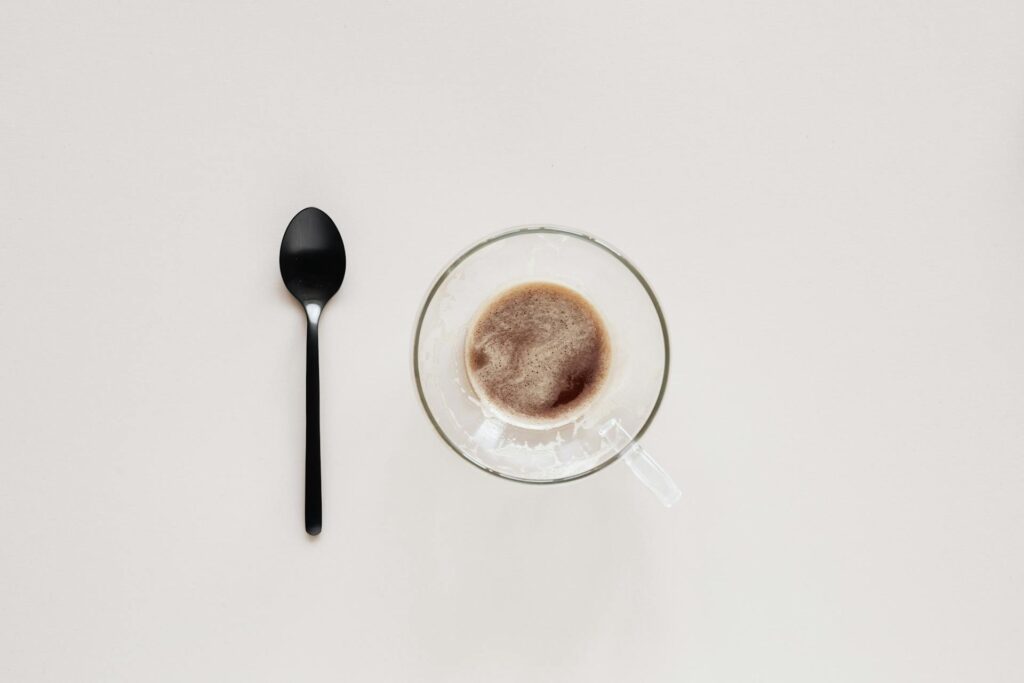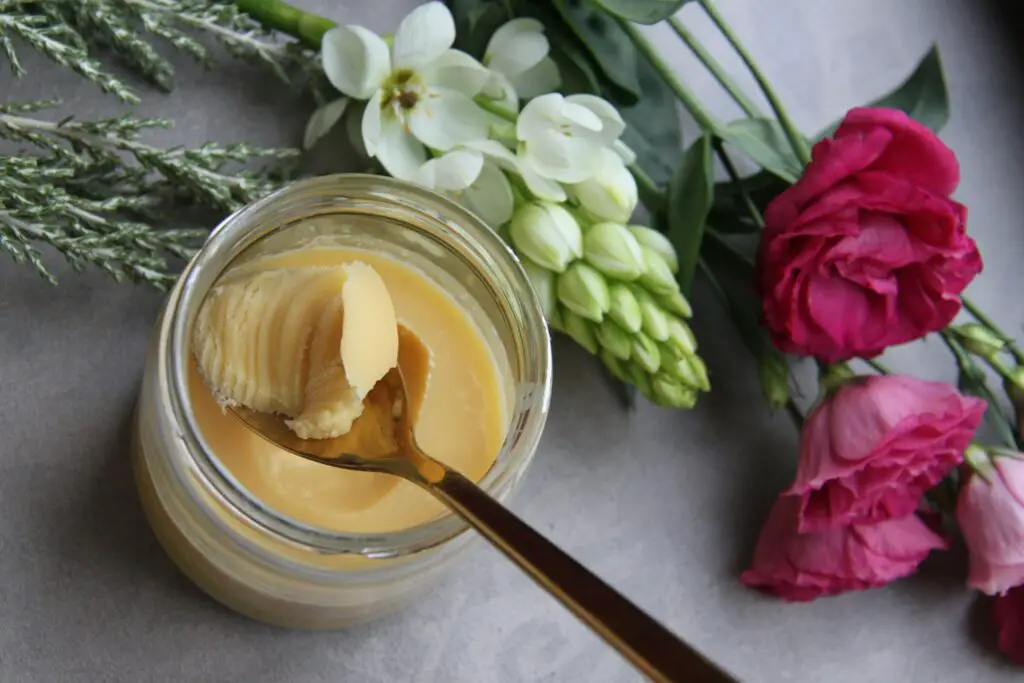The idea of adding ghee to coffee might sound unconventional to some, but it’s gaining traction among enthusiasts.
Adding ghee to coffee can enhance its creaminess and provide a unique flavor profile.
However, its suitability depends on personal preference and dietary considerations.
This article explores the benefits and considerations of adding ghee to your morning coffee.
Whether you’re drawn to its creamy texture or seeking new flavors, we’ll help you decide if this blend is right for you.
Read on to discover if you should indeed put ghee in coffee.

Can You Put Ghee In Coffee?
As we mentioned earlier, yes, you can put ghee in coffee.
Referred to as bulletproof coffee, this blend is gaining popularity.
Many believe that it aids in weight management, boosts energy levels, and offers various health perks.
However, it’s essential to note that individual reactions can vary.
It’s advisable to switch up your morning beverage every month or so to avoid over-reliance on one drink.
If ghee coffee piques your interest, monitor how your body reacts and consult with a healthcare expert if you have specific health or dietary considerations.
How Much Ghee Should I Put In A Cup Of Coffee?

The quantity of ghee you add to your coffee is based on personal taste, yet a frequently suggested ratio is 1 tablespoon of ghee per cup of coffee.
Incorporating ghee into your coffee can provide a nourishing and energizing beginning to your day.
Moreover, it serves as a wholesome alternative to traditional additions like sugar and milk.
For an added flavor boost, consider infusing your ghee coffee with spices such as cinnamon or cardamom.
Can You Taste Ghee In Coffee?
Yes, you can taste ghee in coffee.
With its nuanced, nutty, and mildly sweet taste compared to regular butter, ghee can complement coffee, particularly for those not fond of the sharpness in black coffee.
Adding ghee can naturally tone down the coffee’s bitterness without relying on sugary additives.
Additionally, ghee may contribute to minimizing the acidity and potential inflammation associated with coffee.
Does Coffee With Ghee Reduce Belly Fat?

The blend of coffee with ghee is believed by many to have weight loss benefits and provide various health advantages.
Advocates claim that this combination can potentially decrease belly fat, enhance digestion, balance hormones, and elevate metabolism.
Furthermore, ghee is seen as a suitable option for those sensitive to dairy or lactose.
Nonetheless, while some sources highlight the potential benefits of ghee coffee for weight management and digestive health, others recommend its consumption in moderation, particularly for those with diabetes or certain metabolic conditions.
Introducing ghee to coffee also adds more calories and fats to the beverage, which might not align with everyone’s dietary preferences.
Hence, it’s crucial to approach this practice thoughtfully, taking into account individual health and nutritional needs.
As always, consulting with a registered dietitian or a healthcare expert can provide clarity on whether ghee coffee aligns with your health and weight management objectives.
What Advantages Come From Adding Ghee To Coffee?
Incorporating ghee into coffee has gained attention for various reasons, and here are some of its notable benefits:

- Rich in Nutrients: When combined with coffee, ghee introduces essential vitamins like A, E, and K, which are more readily absorbed due to ghee’s fat content.
- Lactose-Friendly: Ghee offers a lactose-free option for those with intolerance issues, given its absence of milk solids and proteins that are present in regular butter.
- Enhanced Energy & Focus: The fatty acids in ghee can enhance nerve functionality and optimize hormone levels, potentially leading to better mood stability. Some enthusiasts also believe ghee coffee aids in sharpening focus and improving exercise performance.
- Curbs Appetite: The mixture of ghee and coffee might help in reducing hunger pangs, moderating food consumption, and supporting weight management efforts.
- Gentle on Digestion: Ghee is recognized for its digestive ease, making it a comforting choice for individuals with sensitivities, especially those who are lactose intolerant.
- Balanced Caffeine Boost: Adding ghee to coffee is thought to balance out the coffee’s acidity, promoting a smoother caffeine uptake in the body.
What Are The Potential Downsides Of Adding Ghee To Coffee?
While many appreciate the combination of ghee and coffee, there are some considerations to be aware of:
- Caloric and Fat Increase: Ghee being a source of saturated fat can elevate both the calorie and fat intake when mixed with coffee. This might not align with everyone’s dietary preferences, especially those with specific nutritional or weight-related objectives.
- Potential Nutritional Imbalance: Regular consumption of ghee coffee might not offer the diverse range of nutrients present in a comprehensive meal, potentially leading to a deficit in vital vitamins and minerals.
- Concerns Over Saturated Fats: Given its saturated fat content, ghee could pose concerns related to heart health, especially when combined with coffee, which can further enhance saturated fat consumption. This could be particularly relevant for individuals monitoring cholesterol levels or with heart-related worries.
- Digestive Sensitivities: The rich fat content in ghee might not be well-tolerated by everyone, potentially causing digestive disturbances like bloating or loose stools.
- Altered Taste and Texture: Some might find the distinct nutty and slightly sweet profile of ghee less compatible with the flavor of coffee. Moreover, the added fat can modify the coffee’s consistency, making it feel denser or oily.
How Did The Tradition Of Combining Ghee With Coffee Originate?

The fusion of ghee and coffee traces back to ancient practices.
As early as the 7th century, Tibetans adopted the habit of infusing yak butter into tea for its energy-enhancing properties and digestive advantages.
Ghee, a form of clarified butter with roots deep in Indian traditions, has been cherished for culinary, medicinal, and religious purposes for millennia.
While its primary source is cow’s milk, it can also be derived from sheep’s milk.
The earliest evidence of coffee being consumed with clarified butter is in Ethiopia in the 9th century, shortly after the discovery of coffee cherries.
Ethiopians embraced this blend, occasionally augmenting it with spices or salt.
Renowned chefs like Marcus Samuelson and Andrew Zimmern have spotlighted Ethiopia’s rich coffee heritage.
However, the modern trend of integrating ghee into coffee in the U.S. gained momentum through the Bulletproof Diet.
The globally recognized beverage, Bulletproof coffee, crafted by Dave Asprey in 2009, further propelled this practice, capturing the interest of fitness devotees and proponents of varied dietary approaches.
Conclusion
Adding ghee to coffee offers a unique blend with potential health benefits, but its suitability varies based on individual preferences and dietary needs.
As with any dietary choice, moderation and personal experimentation are key.
Whether you’re drawn to its flavor profile or intrigued by its potential advantages, ghee coffee is worth exploring, but always consult with a healthcare professional for personalized advice.



